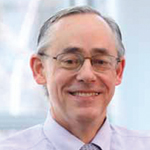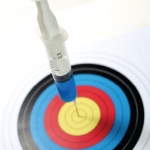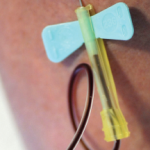
Dr. Pope
When the head of the division steps down, how do you mark that event? The Feinberg School of Medicine, Northwestern University-Chicago hosted a day-long symposium to honor Richard M. Pope, MD, who had been chief of the division for 27 years, according to Harris Perlman, PhD, the new chief of the Division of Rheumatology.
Richard M. Pope, MD, had been chief of the division for 27 years and was Dr. Perlman’s mentor. “We wanted to do more than a dinner.” On May 4, a who’s who of the academic rheumatology community gathered to speak about the research and influence of Dr. Pope. The symposium also served as a philanthropic event to help build a fellowship in Dr. Pope’s name.
Dr. Perlman organized the symposium to honor his former mentor and boss, reaching out to Dr. Pope’s collaborators and trainees. The symposium started with an overview of the basic science. The afternoon covered how rheumatology has changed and progressed during Dr. Pope’s tenure at Northwestern. Rheumatology treatments have gone from gold shots through methotrexate to biologics during the years Dr. Pope served as director of the Division of Rheumatology.
“Dr. Pope has developed an outstanding division with strong research and clinical care. He’s a good mentor and has brought along a lot of faculty for a very long time. It [was] really appropriate to honor him this way,” says Lewis Landsberg, MD, professor of medicine at Northwestern, who delivered the opening remarks.
Eric Ruderman, MD, another professor of medicine at Northwestern, agreed that the symposium was “a better way to honor Dr. Pope than a dinner. It [was] a celebration of his tenure and of the changes in rheumatology during that time. There have been changes in therapies, approaches to therapy and the overall understanding of the diseases. He’s made pretty major contributions to rheumatology through both research and training other people.”
S. Louis Bridges Jr., MD, PhD, professor of medicine at the University of Alabama, Birmingham, also spoke. “I first met Dr. Pope at a meeting. The academic rheumatology community is relatively small,” which meant they kept seeing each other at other meetings. “We became friends. I have lots of admiration for him as a scientist and as a person.”
“Dr. Pope took a good program to a great program, predicated on diversity,” says Dr. Perlman. “Many programs have diversity in research, but concentrate the clinical on one or two diseases. Dr. Pope created a program with clinical work and research around many rheumatoid diseases. Expertise in every area makes the program very different.”
‘Dr. Pope has developed an outstanding division with strong research and clinical care. He’s a good mentor and has brought along a lot of faculty for a very long time. It [was] really appropriate to honor him this way.” —Lewis Landsberg, MD
The Man
Everyone The Rheumatologist spoke with mentioned what a fine person, as well as an exemplary scientist, Dr. Pope is. Dr. Ruderman told a story about being recruited to Northwestern by Dr. Pope. “In making my decision, I consulted a former mentor for his advice. He told me that without knowing what position Dr. Pope offered me, he could advise me that I couldn’t work for a finer man than Dr. Pope.”



